- Home
- Dana Cameron
Burning the Rule Book Page 2
Burning the Rule Book Read online
Page 2
The attraction he felt to Emily was so strong that he sensed she might be Family, but she didn’t act like it, didn’t know any of the pass phrases, and he didn’t dare push any further when she kept looking like at him like he was crazy, saying things she didn’t understand. It had to be going into the Sunshine, fresh from a job and taking out a serial killer that very first night they met that made her seem different, he reasoned.
But his desire never dimmed.
So he continued to stop by the diner whenever he could, and sometimes they’d chat, and he’d swallow the awful coffee, thinking, Someday, it will be better than this. We’ll be together. Then he’d go home and try to sleep, and try to put her out of his mind, and fail at both.
His obsession took deep root. He hadn’t really meant to follow her home three weeks after their first meeting; their respective paths didn’t overlap in any way. He attributed the coincidental change in his route to his well-honed sense for trouble. And he thought he’d managed to keep from being observed following her, another Fangborn skill. It was the fourth time that it happened—what was becoming a habit of sorts—that he realized he was getting hung up on Emily Vargas. Maybe that’s why he never picked up that Sully was following him.
“Hung up” was a nicer way to think of it than “obsessed.”
He still avoided using the word “stalking” even as he recognized that his actions were those of a stalker. He knew better than most what that meant, and he shivered at the thought even as he brushed it away. Truth be told, there was that peculiar frisson of joy and anticipation that attended “stalker,” and he tried to ignore that, too.
It wasn’t a great way to live, but eventually his patience got him the results he wanted.
He woke up one day, three months after that first meeting, so filled with the idea of asking Emily out he could barely think of anything else. Jack had reached the breaking point, needing to know how she felt, and suddenly, finding out seemed of even greater importance than the possibility she might reject him. After an interminable day of filing boilerplate paperwork at his insurance job, he went to the diner that evening, reasoning that she’d feel safer than if he tried to catch up with her as she left her shift. As she poured him his usual, hated coffee, he started in.
“Look, I have to ask you something. I’d love to ask you out, but if you don’t want to go, it’s fine; I’ll never bother you again.” Once he’d started, the words seemed to come out in a torrent, and he felt his face going red with nerves, audacity, and hope. “I mean, you must have guys hitting on you all the time, but I really look forward to chatting with you, and I’d like to find out if there’s something more. If you feel the same way—I mean, of course, if you feel the same way. If you don’t, if it gets weird when I come in, I’ll go someplace else, I promise. I just wanted you to know that I’d like to ask you out.”
It took Emily a moment to tease out what he wanted from the rush of words, but when she did, she smiled. “Yeah, I think that would be nice. Thank you.”
It had happened so quickly, that he blinked. “What?”
She laughed at his confusion, and it was a glorious sound, second only to her repeated, “Yeah, I’d like that. You pick out someplace, okay?”
He went home in a happy daze and couldn’t even be upset that it had been so easy after so much agonizing. Somehow he knew he’d chosen precisely the right moment to ask her.
But Jack did agonize over where to take Emily. He didn’t want to go for flat-out expensive, not wanting to come off as trying to overwhelm and impress her. And he didn’t want to go too casual, because he wanted her to know that he cherished her. So he settled on a tapas restaurant, which was perfect.
Emily was shy and sharp and wary and wonderful. The small plates enchanted her, and she was delighted by the variety of flavors. They had sangria and, with none of the awkwardness that accompanies most first dates, began to talk. She asked what he was reading (hard science fiction and essays); she read history and biographies. That discussion branched into other topics that filled up the time between sitting down and most of the meal. Over dessert, he asked what she was listening to, and found out they shared a love of classical music and jazz. That took them through coffee and the waiters closing down the room. He couldn’t know enough about her.
On the way out, he asked her, “If you could do anything in the world right now, what would it be?”
“Go roller skating,” she answered promptly. Her cheeks were a little flushed with wine and food and . . . happiness, he thought.
Jack was thrilled. “We can do that! We can do that this minute!” Though he didn’t know the first thing about skating or where one skated, he would find out for her.
“No!” She laughed. “I mean, I’d go skating in Versailles.”
Jack wasn’t sure if he’d had too much of the sangria. “Indiana?”
“No, France!” Another laugh, which made him feel silly and weak and invincible all at once. “I mean, I saw a documentary. There were all these long hallways with beautiful artwork. And the Hall of Mirrors? I think that would be just about the best place ever to roller-skate.”
Jack was captivated by the boundlessness of her answer, the imagination, the quickness of it.
“And what about you? What would you do, if time and space and money were no object?”
“I’d ask you for another date,” he answered, sincerely and truthfully.
She smiled and looked up at the stars. “We could do that.”
He dropped her home, and after a quick kiss on the cheek, she ran to the front door of her apartment. He waited until he saw the light in what he knew was her window, and then took to the highway, cranking “The Marriage of Figaro” as he drove. Suddenly, the rotten tang of evil filled his nose, and he focused on a station wagon up ahead. Excitedly, he checked the license plate against a list taped to his dashboard and found a hit: the Family had identified the car as belonging to a serial sex offender. Jack followed, exalted by the chase, his nose so keen that he knew, even in a speeding car on a highway, that the suspect was the driver. His excitement grew to an almost fever pitch as Jack chased the man to his remote hideout, then gleefully, the strains of the Mozart overture still in his head, turned into a wolf-man and tore the predator's throat out.
It was, Jack considered, a perfect evening all in all.
When Emily quietly invited him to stay over the first time, the sex was quiet and calm and real and everything he’d hoped. She was not the tempest he’d known with other women. More like finding home. And as long as she stayed with him, he’d protect her from the entire world.
Even after she started staying over at his place, or he at hers, she never talked about her past. She said once that her background had been hard and, he sensed, dark, but after that, would say no more. That was part of their unspoken deal. She’d continue their relationship, however cautiously, however tentatively, as long as he stuck to the present, and didn’t press her, didn’t pry about her past. A contract to rival that of Bluebeard and his wives. He loved her enough to agree to such a ridiculous condition, but knew he had the means to find out what he needed to know.
That time had come, Jack had realized a week ago, just about six months after their first date. Emily had become distracted, high-strung, and monosyllabic almost to the point of rudeness. She claimed it had nothing to do with him, but he knew that was a lie. He had to know what had changed, what had made her so anxious, but the more he urged her to tell him, the more she retreated. And so, despite his promises, he began to investigate.
There weren’t many people who could defy Fangborn detection skills and keep their lives hidden, but Emily did. There was no government paperwork—no birth certificate, no Social Security number, no license—and no one who knew her now seemed to know anything more of her past than Jack did. It was as if she’d fallen from the sky as an adult with no past at all.
Even as he promised her to let her work it out herself, Jack doubled down in his attempts
to discover more about Emily and her past.
Nothing.
Eventually he had to admit he’d been defeated, and as much as he wanted to, it still took him three days to get up the courage to ask Sully for help.
And now everything he held dear was being threatened.
They arrived all too soon at the rendezvous, a darkened office building in the Financial District. Outside, a tall Asian-American Cousin was chain-smoking cigarettes. A pile of discarded butts lay at his feet. He introduced himself as Terrence Chang and led the way inside to an empty, anonymous conference room.
“Here’s the situation,” he said, all business. “There’s a very important object that all our Fangborn Cousins agree needs to be moved. Apparently there have been warnings that it will be stolen, and we can’t let that happen.”
Sully nodded. “And she’s locked herself up with it, in . . . ?”
“The Tower of London, yes.”
“Well, that should be pretty safe . . .” Sully said. “Why move it?”
Terrence shook his head. “No, you don’t understand. All the portents indicate that it must not stay there. You know we’ve suffered an unusual number of targeted attacks lately? Someone who seems to be looking for and finding us?”
They nodded.
Terrence continued. “The oracles say the object—an ancient sword—needs to be moved. And the oracle refuses to give up the sword until she speaks to you two.”
“Any idea why?” Sully asked.
Terrence shrugged. “She says she can’t, until certain things happen. Certain things that you two must do. Apparently the old girl had something to do with the construction of our safes and defenses in the Tower somewhere back before the flood. She slipped in early this morning, GMT, and called us to explain her demands.” Terrence pulled out another cigarette, frowned at it, and then replaced it in the pack. “We’re gonna have to do this quick. I get the idea that a few of our London Cousins might be willing to chuck a grenade at the door to get in, and they wouldn’t be upset if it took her out as well.”
“Not really?” Jack asked. He knew what it was like to be on the wrong side of the Family.
“Not really, but they’re completely thrown by this behavior, her going against the Family orders like this, taking things into her own hands. It’s just not done.”
There was an awkward silence as Terrence realized his gaffe. “I’m sorry. I wasn’t saying you . . . I wasn’t trying to—” he stammered.
Jack shook his head and looked away. “No sweat.”
But Terrence couldn’t seem to stop himself. “Of course, of course, if the Council decided not to . . . that you were . . . if they decided . . . in your favor, that’s . . . it’s all right, now. Ten years ago, uh, or whatever, water under the bridge—”
Sully broke in gently. “You’ve tried talking to her?”
Terrence and Jack both looked grateful. “We’ve tried reasoning with her, but she’s old. Cussed. Even for an oracle.” Terrence caught himself in a second misstep. “Sorry, God, I’m sorry. Neither of you is . . . ?”
“No,” Jack said.
Sully shook her head. “Werewolves.”
“Well. No need to apologize, then. I’m a vampire, but you know what they’re like.”
Terrence made a gesture, which Jack interpreted as a ward against evil. Some of his Family were superstitious, a fact that Jack found hysterically funny.
“Wait, did any of our other folks have a clue this was coming? Or agree that she—what’s her name?”
“Martha Hudson.”
“Really? There’s a name from Fangborn legend. You’re certain it’s actually her?” Sully asked. “You know about her, right, Jack?”
He nodded. “She was called ‘the guardian of the Home Counties’ and ‘the Chatelaine of London.’ She had a talent for anticipating trouble and protecting her domain, which included Family landholdings in London and the southeast of England.” He whistled. “Who hasn’t heard of her and the Baker Street Family?”
“It’s her, all right. She gave all the passwords.” Terrence laughed bitterly. “She created most of the passwords.”
“So do the other oracles agree that Martha Hudson is doing the right thing?”
Terrence shook his head. “There was no discussion whatsoever. We told as few people as necessary, because there have been rumors that the sword would be stolen. We just didn’t think it would be one stolen by one of our Family. Martha wasn’t in on the discussion, so she must have had a vision of her own. This is truly aberrant behavior for her. She’s been dedicated to us all of her long life, which is long, indeed, as she’s one of the oldest members of our Family in Britain. And she’s never, ever gone rogue like this.”
Jack looked at Sully, who shrugged. “How reliable has she been in the past? Her prognostication and other efforts on the Family’s behalf have been accurate? Trustworthy?”
“Impeccably so.”
“I guess that’s our answer,” Sully said. “Let’s get busy.”
The rebellious oracle answered on the first try. Jack heard the scratchy connection and wondered if the phone in the Tower was an original by Alexander Graham Bell. The Fangborn had been good at protecting humans undetected for millennia.
Terrence put the call on speakerphone.
“Martha Hudson.”
Jack cleared his throat. “Um, Martha, this is Jack Parker. You asked to speak with me?”
“Prove it, if you would.” Her voice was quiet and measured but still had a kind of authority that he could feel. The accent wasn’t rich, upper-crusty, but it was polished. A hint of the Highlands, perhaps?
Jack was confused.
“Do you want me to fax a picture of myself or something?” He glanced at Terrence and Sully. “Like, with my passport?”
“No, I want you to tell me a secret,” the voice said, amused.
“Uh . . .”
“A secret only you know, something you’ve never told anyone.”
Talking to her was eerie, like talking to a ghost. And
Jack was feeling terribly protective of his secrets at the moment.
“How will that prove anything?”
“I’ll know.”
He glanced around at his two colleagues, who, in spite of themselves, perked up with interest and amused smiles. “Uh, I’m seeing this girl. Kind of.”
Sully rolled her eyes. It was true, he hadn’t told her. She’d found out only by snooping.
“Yes, yes,” came the impatient reply. “What’s her name?”
“Look, do we have to do this?” The panic in his voice was audible even to Jack. He could feel Terrence’s gaze on him.
A breathy sigh from across the ocean. “Cousins, will you give Jack a moment’s privacy, please?”
Terrence and Sully exchanged looks. “Sure. There’s a vending machine down the hall. You hungry?”
“I’m always hungry,” Sully said. She watched Terrence leave, then put a reassuring hand on Jack’s arm, nodding. She left, shutting the door carefully behind her.
Jack shut down the speakerphone and picked up just in case; vampires and werewolves had sharp hearing. “Emily. Emily Vargas.”
“And? What aren’t you telling me?”
Jack sighed. “She’s a Normal. I know it’s irregular. I haven’t reported her as a close friend to the Family, but I promise, I haven’t told her anything about our powers or our purpose.”
“Most Normal humans would not appreciate us taking the law into our own hands,” Martha said. “Even if it is to protect them.”
Jack caught himself before he brought up that most Family didn’t appreciate when he’d taken Fangborn laws into his own hands. “Right.”
Almost as if she could read his mind, Martha said, “And yet, if I understand correctly, you’ve been working very hard lately to keep your nose clean. Keeping your head down, no blots on your copybook. Why not tell them about Emily? You know that’s one of the most ancient rules, reporting long-term relatio
ns with Normals. And it would make your situation far less precarious.”
“Yes, it’s just . . . it’s complicated. I’m trying to protect her.” He knew it sounded weak, suggesting that the Family would ever do Emily any harm. “The fewer people who know where she is, the better, I think. It’s a gut feeling.” He’d been balancing his desire to keep his nose clean with breaking another cardinal rule, and it had been eating him up.
His greatest fear coincided with the happiest time of his life.
“Very good,” Martha answered after a moment. “I believe you are who you say you are, and I have a task for you.”
Jack felt as if he was being sent to the principal’s office after being pulled out of class. A pit opened up in his gut. It had been so long since he’d been this afraid, and that doubled his discomfort. “Okay.”
“You need to go to East Eighty-First Street in New York City. There’s an artifact there, a small clay figurine. It is fragile, it is ancient. It’s about four inches tall, a male figure with an extended arm, with robes or a skirt of some sort. It is hugely important that you steal it.”
“Why?”
There was a rasping sigh on the other end of the line, barely audible over the transatlantic hiss. “Because I have seen . . . others, generations of Fangborn, perhaps, will suffer. Normals will suffer. Your line, Jack Parker, will suffer.”
I don’t have a line, he thought. And never will, with Emily. But I still have Family.
“All I can foretell is that it’s imperative you do as I say. But, perhaps I can convey something of what your failure may mean—”
Suddenly, Jack’s mind was filled with images of mobs, Normal humans overwhelming Fangborn Cousins.
The scenes resolved with piercing clarity: police and, eventually, the armed forces were co-opted to bring in the Fangborn population to so-called internment camps, now dotting the countryside. Allegedly constructed for the Fangborn population’s own safety, families were separated, and those who resisted—for weren’t they American citizens, guaranteed due process if accused of a crime?—were treated as criminals. As time progressed, fear of the Fangborn escalated. More extreme methods of finding Family and dealing with holdouts were rationalized and justified.

 Hellbender (Fangborn Book 3)
Hellbender (Fangborn Book 3) Hellbender (The Fangborn Series Book 3)
Hellbender (The Fangborn Series Book 3) Hellbender
Hellbender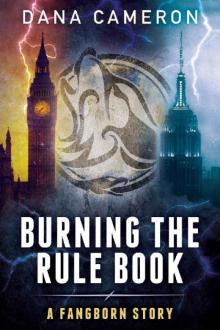 Burning the Rule Book
Burning the Rule Book Site Unseen
Site Unseen Ashes and Bones
Ashes and Bones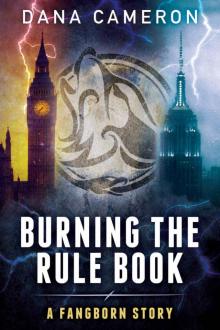 Burning the Rule Book (A Fangborn Story 3)
Burning the Rule Book (A Fangborn Story 3) Sugarplums and Scandal
Sugarplums and Scandal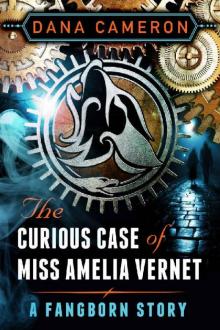 The Curious Case of Miss Amelia Vernet
The Curious Case of Miss Amelia Vernet More Bitter Than Death
More Bitter Than Death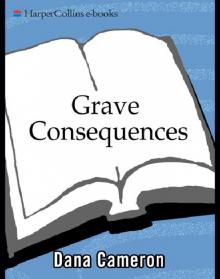 Grave Consequences
Grave Consequences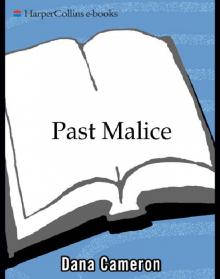 Past Malice
Past Malice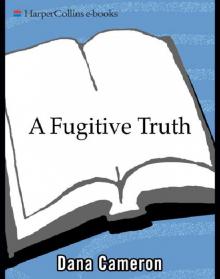 A Fugitive Truth
A Fugitive Truth Seven Kinds of Hell
Seven Kinds of Hell